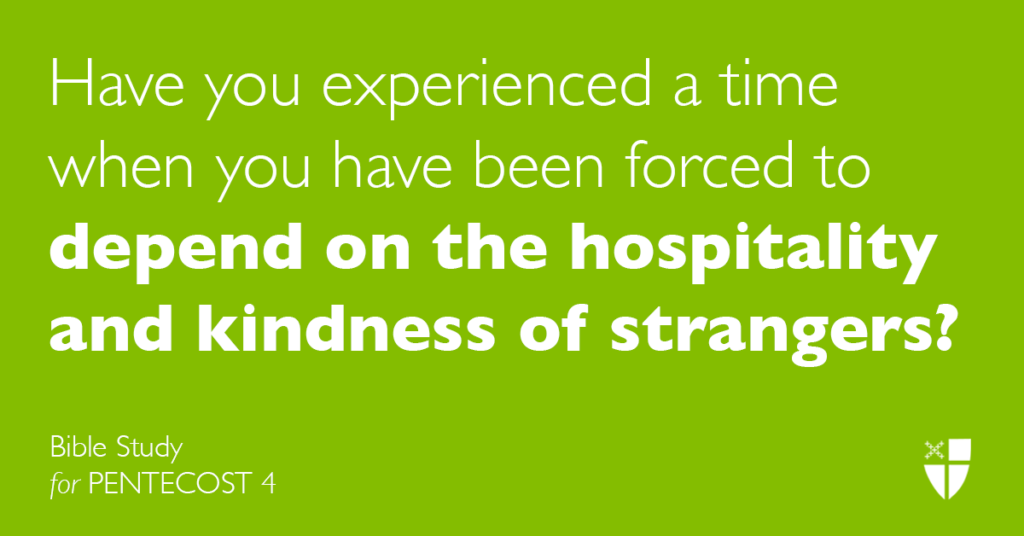This page is available in: Español
Bible Study: Proper 9 (C) – 2019
July 07, 2019
2 Kings 5:1-14

Naaman was a wealthy commander of the army of the king of Aram. Though he was a person of great power and prestige, he suffered from leprosy, a condition that visibly marked him as different from those around him. Eager to be cleansed of his leprosy, Naaman traveled with massive amounts of treasure to the King of Israel in hopes that his leprosy could be cleansed. Though the King of Israel admitted his inability to help Naaman, the prophet Elisha gave the army commander very simple instructions: “Go, wash in the Jordan seven times, and your flesh shall be restored and you shall be clean” (2 Kings 5:10). Naaman was infuriated by the simplicity of the instructions, and he initially refused to comply. When he did eventually follow Elisha’s instructions, his leprosy was miraculously cleansed.
Though our attention quite naturally is focused on Naaman’s miraculous cleansing, we should not miss the fact that he is helped by many different people in his quest to be cleansed of his leprosy. Though the most obvious of these may at first be the prophet Elisha, several other unnamed characters play essential roles in this story. A young Israelite girl taken captive by the Arameans first recommended that Naaman travel to Israel. When Naaman was infuriated by Elisha’s simple instructions, his servants convinced him to actually go to the waters of the Jordan River and wash. Those who seemed to be of least importance played pivotal roles in helping Naaman be cleansed of his leprosy. God uses people whom the world regards as insignificant to accomplish amazing things.
- What persons of apparent insignificance might be bringing us good news?
Psalm 30
The psalmist often speaks with a candor and sincerity that can disarm us. Here in Psalm 30, the psalmist speaks from a place of deep dependence on God, recalling how God heard his cry and lifted him from the depths of despair. This psalm contains one of my favorite lines from the whole psalter: “Weeping may spend the night, but joy comes in the morning.” These words capture both an essential element of what it is to be human and the hope that infuses our life of faith. We will all know hardship, struggle, and loss. We will all have experiences of sustained lament and weeping. As Christians, however, we believe and proclaim that God will be with us in and through it all, and we know that despair will not last forever. Joy will indeed come again in the morning after the long night of lament.
- When have you experienced the presence, comfort, and joy of God after a period of struggle or despair?
Galatians 6:1-16
Though Paul has a loving and friendly relationship with many of the communities he addresses in his letters, he is highly critical of the church at Galatia throughout his letter to them. This passage marks the end of his letter to the church at Galatia, which had been plagued by division over the question of circumcision and whether it was necessary for Gentile believers. In his closing words to the Galatians, Paul concludes with words of encouragement. He exhorts them to always continue in doing what is right and to work for the good of everyone. To a community divided over the question of Gentile circumcision, Paul emphasizes the cross of our Lord Jesus Christ as the core of the Christian faith: “May I never boast of anything except the cross of our Lord Jesus Christ, by which the world has been crucified to me, and I to the world. For neither circumcision nor uncircumcision is anything; but a new creation is everything!” (Galatians 6:14-15). Paul exhorts the Galatians to focus on what unites them with all Christians — Jesus Christ, the crucified and risen one.
- Have you experienced a time when you have become so focused on a minor issue that you lost track of what is most important?
Luke 10:1-11, 16-20
Though we speak frequently of the twelve named apostles appointed by Jesus, this passage reminds us that Jesus also appointed many others as messengers of the good news. Here we are told that He appointed seventy others to go out into the towns and cities. His advice to them may seem surprising: “Go on your way. See, I am sending you out like lambs into the midst of wolves. Carry no purse, no bag, no sandals.” Jesus makes it clear that they are being sent out into potentially hostile territory, yet he demands that they take nothing with them, not even the most basic of supplies.
Instead, those appointed by Jesus are to depend on the hospitality of strangers. In their movements from house to house, they are to accept lodging, food, and drink wherever they can find it. If they are not welcomed in one place, they are simply to move on to the next one. Jesus’ instructions to these seventy apostles reminds us that the Christian life is not always one of comfort and stability. As Christians, we are sent out to face circumstances we cannot fully imagine, yet we know that God goes with us and will provide all that we could need.
- Have you experienced a time when you have been forced to depend on the hospitality and kindness of strangers? How did you respond to it?
This page is available in: Español
Don’t forget to subscribe to the Sermons That Work podcast to hear this sermon and more on your favorite podcasting app! Recordings are released the Thursday before each liturgical date.
Receive Free Weekly Sermons That Work Resources!
This page is available in: Español


